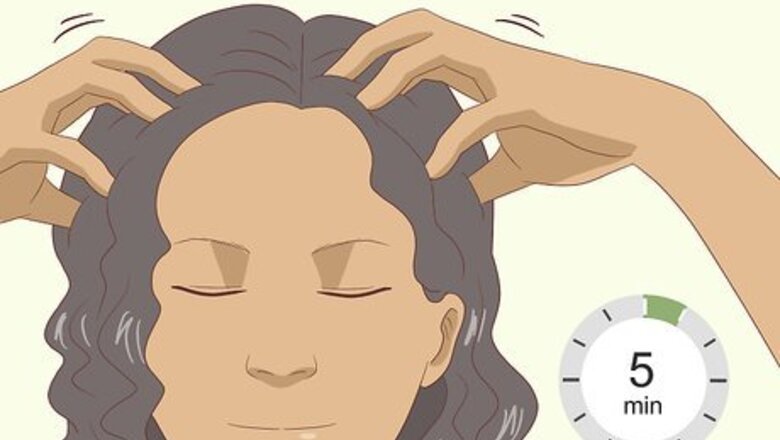
views
Encouraging New Growth
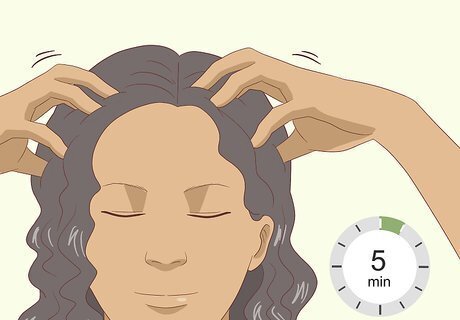
Massage your scalp daily. Healthy hair starts at the scalp. Massaging your scalp for 5 minutes a day can help stimulate blood flow to your hair follicles. This, in turn, encourages new hair growth. You can massage your scalp in the shower when you’re shampooing, or whenever you have a few minutes. Use the pads of your fingers instead of your fingernails to massage your scalp. Your nails may cause irritation and breaking on your skin if you massage too hard.
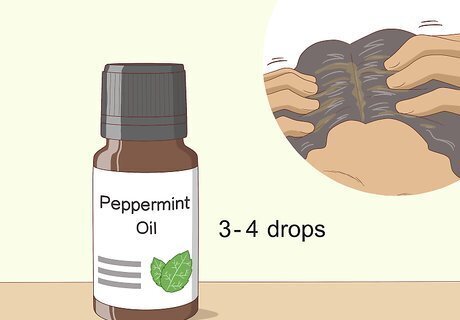
Apply 3-4 drops of peppermint oil to your scalp every day. Peppermint essential oil can help stimulate hair growth when it is applied directly to your scalp. Apply several drops to your scalp and massage it in with the pads of your fingers. Repeat this process at least once a day for at least 4 weeks to encourage new growth. To get the best results, use a few drops of true peppermint essential oil mixed with 1 tablespoon (15 mL) of coconut oil. Do not use a peppermint-scented oil. Scented oils smell like peppermint, but they won’t have the same stimulating effect.

Use shower products formulated for hair growth. Some shampoos and conditioners are formulated specifically to encourage hair growth and help you achieve long hair. Look for a shampoo that says it's formulated for hair growth and that has ingredients like: Biotin Minoxidil Niacin Tea tree oil Vitamin E
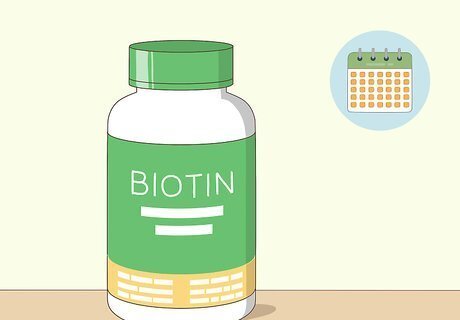
Take a 5,000 mcg biotin supplement daily. Biotin, or vitamin B7, is an essential B vitamin. It has long been used to help encourage new hair growth and is often the primary ingredient in other hair supplements. Take a supplement of at least 5,000 mcg every day to help encourage your hair to grow long and thick. Biotin supplements are available over-the-counter at most pharmacies and health food stores. You can also look for hair, skin, and nail vitamins, which contain biotin. Biotin is also available as a topical treatment. If you opt for topical biotin, follow the application directions on the packaging.
Preventing Damage to Existing Hair
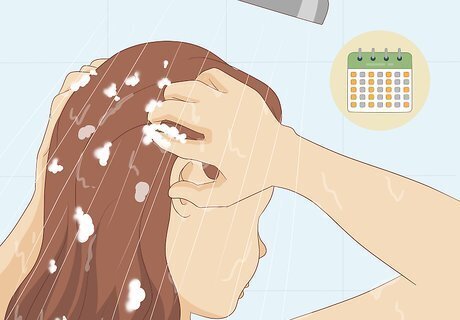
Wash your hair 3-4 times a week. Some people have reported longer hair after reducing the amount they wash with shampoo and conditioner. Consider washing your hair every 2-3 days. On no-wash days, wear a shower cap when you shower and use dry shampoo to help keep oil controlled. If your hair tangles easily, you may need to wash more frequently. Using conditioner daily or every other day can help keep away tangles that may otherwise cause breakage.
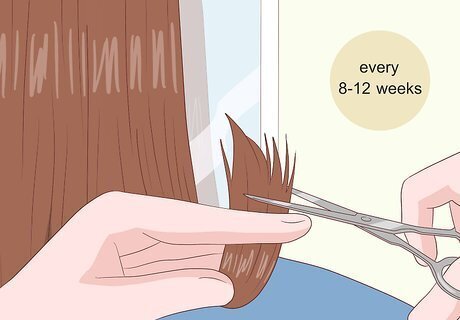
Get a trim every 8-12 weeks. Damage often starts at the ends of your hair and moves upward toward the roots. Getting regular trims stops damage in its tracks and removes split ends, preserving your locks for the long haul. See your stylist every 2-3 months and ask them to cut off no more than 0.5 in (13 mm) from your ends to keep the damage from spreading. If your hair gets damaged unexpectedly by an accident with a hot tool or a chemical treatment, see your stylist as soon as possible. If you don’t have the time or the money for regular salon appointments, you can also try to trim your hair yourself. Get a good pair of hair shears if you choose to do this. They make a huge difference.
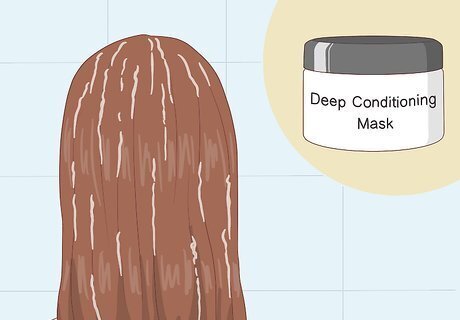
Use a weekly deep conditioning mask for a dose of hydration. Deep conditioning treatments can help protect your strands and keep tangles away. Look for a hair mask that is formulated for your hair type (e.g., thick, thin, curly, dry, color-treated, etc.). Ask your stylist for help picking the right product for you if you are unsure what will work for you. Apply the mask to your hair after you shampoo and leave it on for the amount of time recommended on the packaging. Some masks may take 3-5 minutes, while others may take 10-15. Then, rinse your mask out in the shower. You can find hair masks at most cosmetics and beauty supplies stores, as well as at many pharmacies and drug stores.
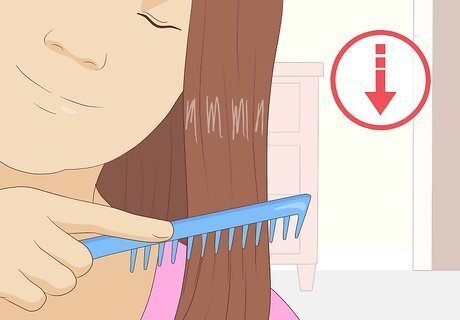
Minimize the amount you brush your hair. Brushing can encourage breakage and pull on healthy hairs, so reduce the amount you brush as much as possible. Try to brush only to get tangles out after showers or when styling your hair. When you do brush your hair, make sure to use the right brush. A wide-toothed comb or shower comb works well on both wet and dry hair to remove tangles without pulling too much. Boar-bristle brushes also work well, but are best suited for dry hair.
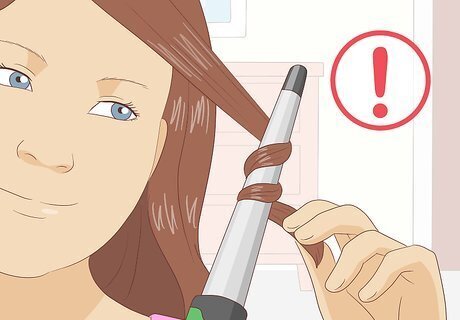
Limit your use of hot styling tools. Heat damages your locks from cuticle to tip. That’s why it’s best to stay away from hot tools as much as possible. This includes blow dryers, flat irons, curling irons, hot brushes, crimpers, and hot rollers. If you must blow dry your hair, use the low setting and stick to your ends. Use a thermal spray if you absolutely must use a hot tool on your hair. Hold the spray arms-distance away from your head and mist your hair before using the hot tool.
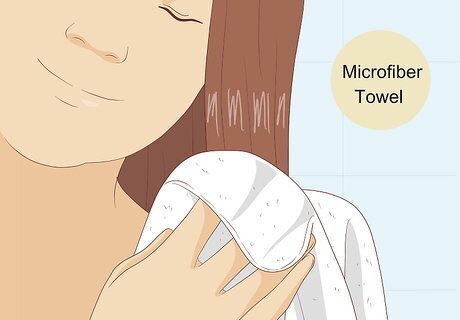
Avoid terry cloth and use a microfiber towel on wet hair. Certain materials, such as terry cloth, can be damaging to wet hair. Avoid using terry cloth towels to dry your hair. Instead, allow it to air dry as often as you can. If you need to soak up extra water out of the shower, try using a microfiber towel. Never wrap it and leave it on top of your head. Instead, lightly squeeze out the excess water.
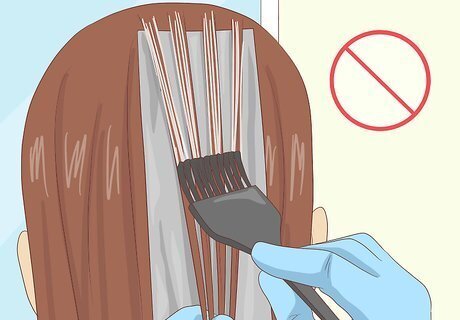
Skip harsh chemical treatments to prevent damage. Treatments such as coloring, highlighting, perming, chemically straightening, and lightening your hair all cause damage. If you want to grow long, luscious locks, you will need to cut all of these out of your routine. If you already have colored or chemically treated hair, talk to your stylist about how to best transition your style.
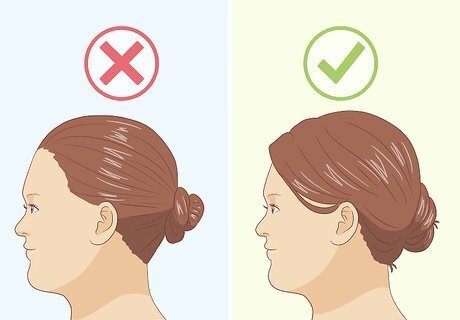
Opt for loose hairstyles like low ponytails or messy buns. Many hairdos and styles are hard on your scalps and strands. Styles that pull your hair tight, like high or slick ponytails and certain types of braids, encourage breakage. Avoid damage by wearing your hair down or in loose styles like low ponytails and messy buns as much as possible. Especially avoid styles that put a lot of tension around the edges of your head and the nape of your neck. Extensions may look pretty at the moment, but your hair may be worse off when you take them out. Try to avoid these styles whenever possible, or use clip-in hair extensions to reduce the chances that they will damage your hair.
Making Lifestyle Changes
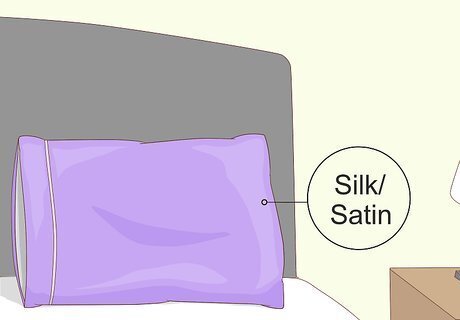
Sleep on a silk or satin pillowcase to prevent hair damage. Silk and satin are thought to be softer on your hair than cotton. These materials may help prevent tangles, which in turn can cause breakage. Invest in a few good silk or satin pillowcases to keep your hair long and glowing. You can find relatively affordable silk pillowcases at many home goods stores, as well as online. Satin tends to be a little more affordable than silk.
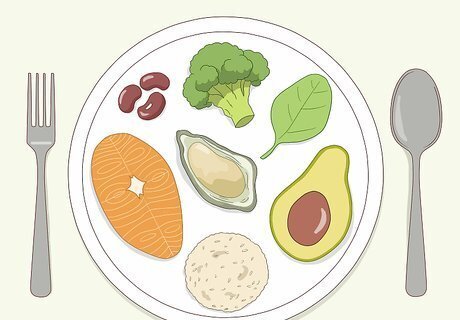
Eat a hair-healthy diet to encourage growth. To get the most from your hair, you need to nourish it properly and drink plenty of water. Aim for a diet that prioritizes protein. Lean proteins should make up about 15% to 25% of your daily calories. Also, eat plenty of leafy green vegetables, and increase your water intake, as well. Feed your strands iron-rich foods like spinach, beans, and moderate amounts of lean red meat. Additionally, your hair benefits from increased iron, omega 3, zinc, and biotin intake. Whole grains, oysters, peanut butter, and seeds are all good sources of zinc. Add more fruits and vegetables to your diet. They contain vitamins A, C and E, all of which may help maintain scalp and hair health. Vitamin C can be especially helpful if you have hair loss due to iron deficiency, since vitamin C helps your body absorb iron. Eggs, meats, nuts, seeds, salmon, dairy, and avocado are all rich in hair-healthy biotin. Salmon, flax, chia seeds, and walnut are all high in omega 3 fatty acids.
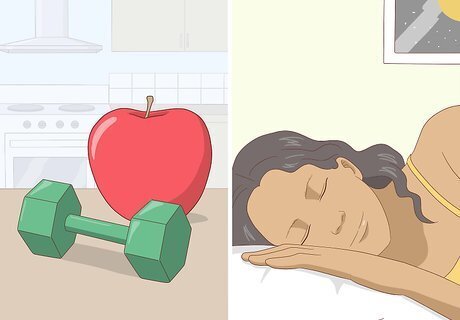
Manage your stressors. Eating well, exercising regularly, and getting a good night's rest are all huge factors in staying stress-free. Intense stress of any kind can lead to all sorts of physical symptoms, including reduced or stunted hair growth. Try to get at least 30 minutes of moderately vigorous physical activity at least 5 days a week. A moderately vigorous pace is one where you can still hold a conversation, but only barely. This isn’t just healthy for your body, it can also help calm your mind. Try meditation or deep breathing exercises to help you quiet your mind when you are particularly stressed.
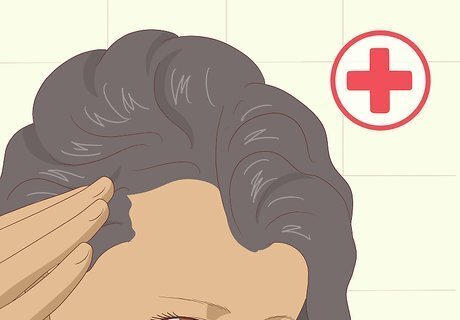
Talk to your doctor if you notice hair loss. If you have noticeably slow hair growth or any hair loss, you may have a medical issue. Make an appointment with your doctor to talk about your symptoms and seek any diagnostic testing you may need. Genetics or family history can also play a role in health and hair growth. Women are particularly susceptible to hair loss when they have elevated androgen levels. This is common with conditions like polycystic ovarian syndrome.














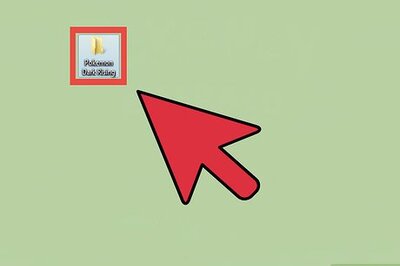





Comments
0 comment